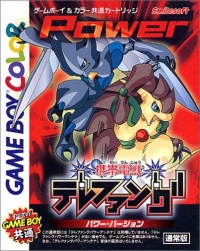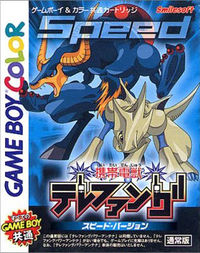Telefang 1: Difference between revisions
(New page: {{for|the second version of Keitai Denjū Telefang|Keitai Denjū Telefang 2}} {{Infobox game | japname = 携帯電獣テレファング | romaji = Keitai Denjyuu Terefangu | image = [[Ima...) |
No edit summary |
||
| Line 5: | Line 5: | ||
| romaji = Keitai Denjyuu Terefangu | | romaji = Keitai Denjyuu Terefangu | ||
| image = [[Image:Telefang Power Version.jpg|200px]]<br /><br />[[Image:Telefang Speed version.jpg|200px]] | | image = [[Image:Telefang Power Version.jpg|200px]]<br /><br />[[Image:Telefang Speed version.jpg|200px]] | ||
| developer = Smilesoft | | developer = Smilesoft | ||
| publisher = Natsume | | publisher = Natsume | ||
| designer = Takagi Toushi | | designer = Takagi Toushi | ||
| Line 12: | Line 12: | ||
| mode = Single player | | mode = Single player | ||
| platform = [[wikipedia:Game Boy Color|Game Boy Color]] | | platform = [[wikipedia:Game Boy Color|Game Boy Color]] | ||
| media = 16 megabit catridge }} | | media = 16 megabit catridge <ref name="wikipedia">http://en.wikipedia.org/wiki/Keitai_Denjuu_Telefang. Accessed on 13 January 2008.</ref>}} | ||
'''Keitai Denjū Telefang''' is a video game for [[wikipedia:Game Boy Color|Game Boy Color]] written in Japan. It is available in two versions, namely Power version and Speed version. | '''Keitai Denjū Telefang''' is a video game for [[wikipedia:Game Boy Color|Game Boy Color]] written in Japan. It is available in two versions, namely Power version and Speed version. | ||
| Line 21: | Line 21: | ||
==Version differences== | ==Version differences== | ||
The two versions, Power and Speed, have some differences: | The two versions, Power and Speed, have some differences: | ||
* In Power version, the starter partner you will have is [[ | * In Power version, the starter partner you will have is [[Krypto]] but in Speed version it is [[Fangs]]. | ||
* There are different Denjuu appearances in the two versions. | |||
* There are some colour changes in the two such as the colour of the [[D-Shoot]] menu. | |||
* In Power version, at [[Baubana Lake]], the order of houses one is required to enter to solve the puzzle is different than that in Speed version. | * In Power version, at [[Baubana Lake]], the order of houses one is required to enter to solve the puzzle is different than that in Speed version. | ||
| Line 28: | Line 30: | ||
Keitai Denjū Telefang was originally only available in Japanese. However, pirates in China bootlegged it under the name of [[Pokémon Diamond]] and [[Pokémon Jade]]<ref name="wikipedia" />. Their attempt was not very good, as the English is poor with some vulgarities included. | Keitai Denjū Telefang was originally only available in Japanese. However, pirates in China bootlegged it under the name of [[Pokémon Diamond]] and [[Pokémon Jade]]<ref name="wikipedia" />. Their attempt was not very good, as the English is poor with some vulgarities included. | ||
The sprites and maps remain the same, just that it is English. The ability to name the character was also not present, and the game would also not | The sprites and maps remain the same, just that it is English. The ability to name the character or the Denjuu was also not present, and the game would also not load properly. | ||
The [[phone number]]s that were of special characters like [[Musa]] could only be obtained on the | The [[secret phone number]]s that were of special characters like [[Musa]] could only be obtained on the [[Smilesoft]]'s website, and the player is required to enter the phone number into the [[D-Shoot]]. The phone numbers are correct on both bootleg and original versions; however in the bootleg once the call ends and the number should be saved, it does not function properly in the bootleg and will crash. | ||
==See also== | ==See also== | ||
* [[ | * [[Denjuu]] | ||
* [[Keitai Denjū Telefang 2]] | * [[Keitai Denjū Telefang 2]] | ||
==Refences== | ==Refences== | ||
<references /> | <references /> | ||
Revision as of 11:57, 18 January 2008
- For the second version of Keitai Denjū Telefang, see Keitai Denjū Telefang 2.
| Telefang 1 | |
 
| |
| Developer(s) | Smilesoft |
|---|---|
| Publisher(s) | Natsume |
| Designer(s) | Takagi Toushi |
| Release date | 3 November 2000 |
| Genre | Console role-playing game |
| Platform | [[wikipedia:Game Boy Color|Game Boy Color]] |
Keitai Denjū Telefang is a video game for Game Boy Color written in Japan. It is available in two versions, namely Power version and Speed version.
The name
Keitai means mobile in Japanese, while Den means electric, jū means monster, and telefang is a English word in Katakana to mean something like Telephone Fangs (monsters).[1]
Version differences
The two versions, Power and Speed, have some differences:
- In Power version, the starter partner you will have is Krypto but in Speed version it is Fangs.
- There are different Denjuu appearances in the two versions.
- There are some colour changes in the two such as the colour of the D-Shoot menu.
- In Power version, at Baubana Lake, the order of houses one is required to enter to solve the puzzle is different than that in Speed version.
Bootleg
- Main article: Bootleg version of Keitai Denjū Telefang
Keitai Denjū Telefang was originally only available in Japanese. However, pirates in China bootlegged it under the name of Pokémon Diamond and Pokémon Jade[1]. Their attempt was not very good, as the English is poor with some vulgarities included.
The sprites and maps remain the same, just that it is English. The ability to name the character or the Denjuu was also not present, and the game would also not load properly.
The secret phone numbers that were of special characters like Musa could only be obtained on the Smilesoft's website, and the player is required to enter the phone number into the D-Shoot. The phone numbers are correct on both bootleg and original versions; however in the bootleg once the call ends and the number should be saved, it does not function properly in the bootleg and will crash.
See also
Refences
- ↑ Jump up to: 1.0 1.1 Cite error: Invalid
<ref>tag; no text was provided for refs namedwikipedia